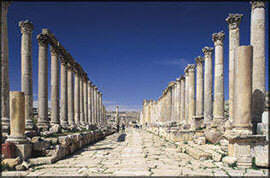 THE EXECUTIVE BRANCH THE EXECUTIVE BRANCH |
Government
The Legislative Branch
 THE HASHEMITE MONARCHY THE HASHEMITE MONARCHY |

The throne of the Kingdom is passed on through inheritance within the dynasty of King Abdullah Ibn Al Hussein, in the direct line of his male heirs. The King may designate a Crown Prince.
The present King's younger brother, HRH Prince Al Hassan Ibn Talal, has been Crown Prince since 1965.
The King is head of state and is immune from all liability and responsibility. He approves laws, directs the government to promulgate and enforce bylaws and regulations, exercises judicial authority by Royal Decree, orders parliamentary elections, and inaugurates, adjourns, suspends and dissolves the lower house under the constitution.
The King appoints the prime minister, and the cabinet ministers upon the prime minister's recommendation. The cabinet must be approved by parliament through a vote of confidence. As the Supreme Commander of the Armed Forces, the King has the power to declare war, conclude peace, and sign treaties and agreements.
 THE CABINET THE CABINET |
The constitution allows the King to appoint, release or accept the resignation of the prime minister, and of cabinet ministers upon the recommendation of the prime minister. | The Council of Ministers, the highest arm of the state, should submit its policies and plan of action for the approval of the lower house of parliament within a month of assuming office. A vote of no confidence by the house results in the resignation of the cabinet or the minister(s) in question.
The cabinet presides over and controls the government through ministers, heads of statutory bodies attached to the prime minister, administrative governors and local government councils.
 LOCAL GOVERNMENT LOCAL GOVERNMENT |
The country is divided into twelve governorates, each headed by a governor and subdivided into administrative regions.
The governorates are an extension of the central government, and are supervised by the Ministry of the Interior. Governors enjoy wide administrative authority, and in specific cases they exercise the powers of ministers.
Municipal councils within a governorate are elected by local residents for a four-year term. However, in cases of legal disputes or lack of a quorum, the governor can appoint a municipal committee for an extendable two-year term. Starting in July 1995, nationwide municipal council elections were held on the same day, with a number of women winning seats for the first time. Similar to the 1993 parliamentary elections, they showed the strength of tribal and family affiliations in people's voting practices, and greater concern about improved local services than political ideologies.
The mayor and half of the council of the Greater Amman Municipality are appointed by the government, and the other half elected.
At the village level, each village has a council appointed by the governor, and councils are changed as the governor deems necessary. |

